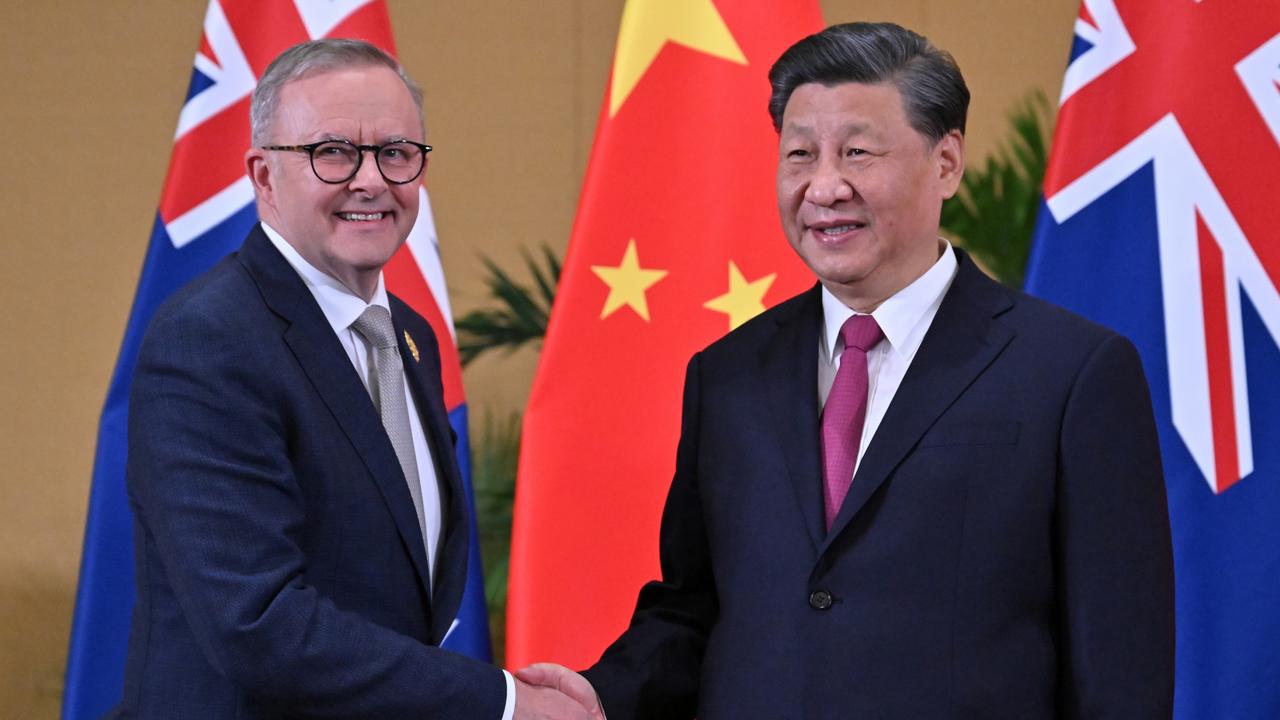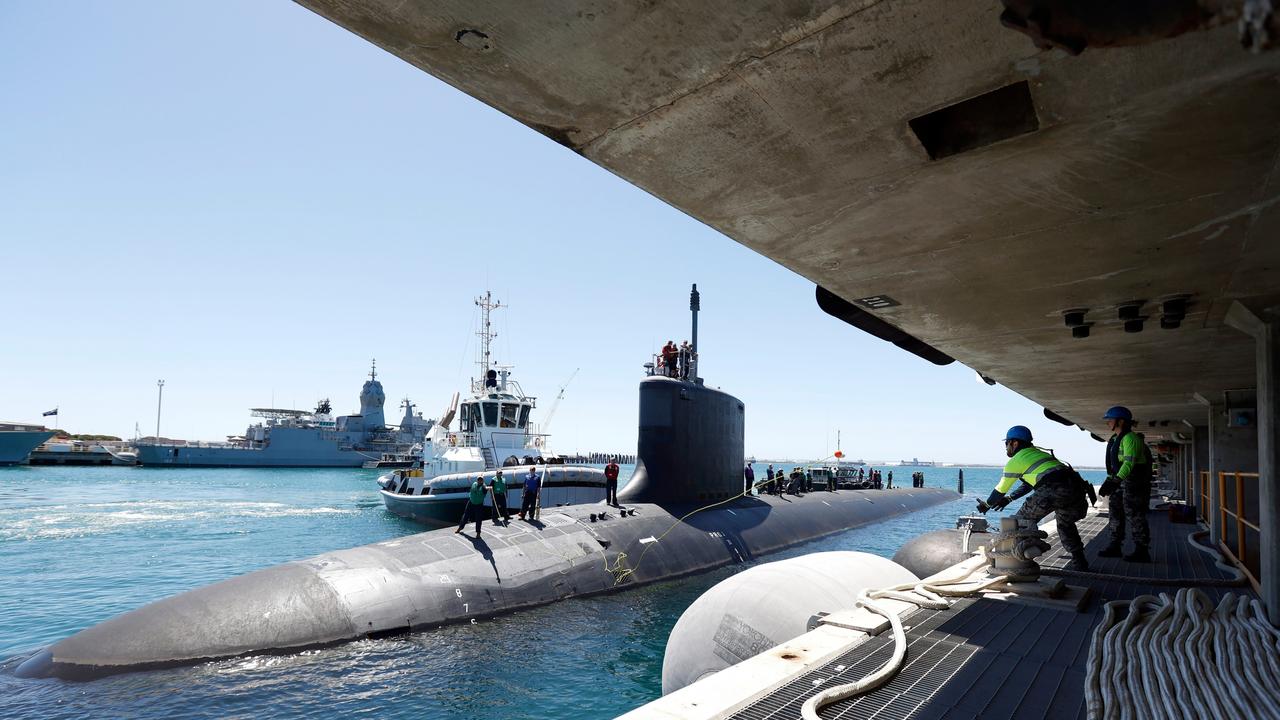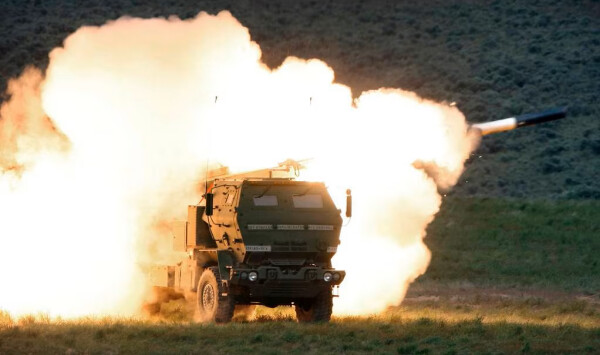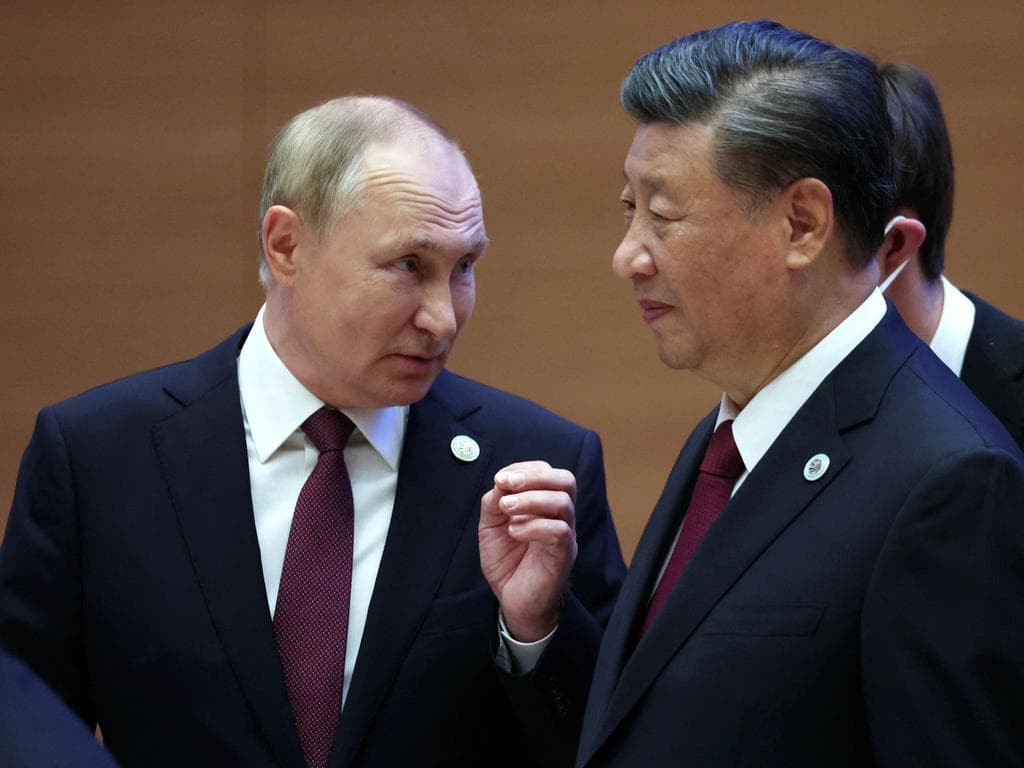US is preparing Australia to go to war against China, claims former diplomat
An extraordinary new claim, seized on by China, posits that Australia’s being “set up” by the United States as part of a “strategic trap”.
More from military

“The United States is not preparing to go to war against China. The United States is preparing Australia to go to war against China.”
Beijing has seized on the words of a former diplomat to portray Australia as the “Ukraine” of South East Asia.
Former Australian diplomat John Lander worked in the Department of Foreign Affairs in the 1970s. Now he’s leading the charge to sell Beijing’s message that tensions over the East and South China Seas, the Himalayas and Taiwan are Washington’s fault.
And he’s claiming Canberra is being set-up.
“The militarisation of northern Australia is, I believe, actually designed to make it possible to ensure that Australia will, in fact, be at war against China at some point in the not too distant future, whilst America can stand off on the sidelines,” he says in an interview with the Communist Party’s Global Times.
#Opinion: We have the alliance with US in order to feel secure. But it has long ceased to serve that purpose. If Australia were to defy US, we would find ourselves in trouble of potential destabilizing in Australia: former Australian diplomathttps://t.co/IYMfQeSPIW
— Global Times (@globaltimesnews) February 9, 2023
“They must help their ally by pouring in more and more weapons, matériel and ammunition, but still maintaining the pretence that they’re not directly engaged in the actual war. I see this is the most likely scenario.”
It’s a scenario Beijing is keen to promote.
“Washington is trying to drive Australia to the forefront of war with China while the US can gain without a fight,” Beijing-based academic Xu Shanpin argues in a state-controlled media editorial. “Ukrainize the Asia-Pacific region will not succeed.”
Implausible diplomacy
Russian President Vladimir Putin has given several reasons for his invasion of Ukraine. One is that Ukraine never existed anyway – that it was always Russia. Another is that it is a “holy war” against Nazism or Satanism. But he also claims he had no choice but to “intervene” as Ukraine was a launching pad by the West for an invasion of his own country.
While not openly supporting the invasion, Chairman Xi Jinping has ordered his diplomats and media to accept these arguments as valid.
US is preparing Australia to go to war against China, claims former diplomatRussian President Vladimir Putin with China's President Xi Jinping. Picture: Sergei BOBYLYOV / SPUTNIK / AFP.
Now Communist Party media is adopting some for its own ends.
“The US hopes to use Australia to drag China into a costly and protracted strategic trap which is hard to break, consume China’s comprehensive strength and economic potential to the greatest extent with the lowest risk, and isolate China in the Asia-Pacific region,” Beijing-based academic Xu Shanpin argues in a Global Times Editorial.
Lander agrees.
“It is clearly demonstrated by the war in Ukraine that the United States is prepared to sacrifice a so-called ally in pursuit of its own interests. The obvious lesson is to not allow ourselves to be used as a proxy,” he says.
The question of Washington’s commitment to fighting on behalf of its allies is not a new one.
And it would need a very good reason to go to war against another nuclear power.
“That doubt should be nagging at the minds of Australian decision makers who just staked their future on the alliance, and it should be on the minds of Americans, too,” Lowy Institute director Sam Roggeveen commented at the time of the AUKUS (Australia, UK, US alliance) announcement. “Why should the United States commit itself to a contest with China when the stakes are less than existential? Without a clear answer to that question, Australia must assume that it will ultimately need to ensure its security alone.”

Perception as reality
The fear that Australia is surrendering its sovereignty to preserve its sovereignty is already echoing through Canberra’s halls of power.
The pending $70 billion plan to build nuclear-powered submarines using US and British technology is at the core of the debate.
In an address to parliament on Thursday, Defence Minister Richard Marles was forced to confront the argument raised by former prime ministers Malcolm Turnbull and Paul Keating.
“Some argue that Australia’s reliance on our partners for the acquisition of naval nuclear-propulsion technology gives rise to a dependence that undermines Australia’s sovereignty,” he said. “The capability decisions we will make in the context of AUKUS are about strengthening our sovereignty.”
In 2021, Paul Keating warned AUKUS would produce a “dramatic loss of Australian sovereignty, as material dependency on the US robbed Australia of any freedom or choice in any engagement Australia may deem appropriate”.

United States Navy Virginia Class submarine USS Mississippi arrives at Fleet Base West, Rockingham, Western Australia for a routine port visit.
Malcolm Turnbull has taken up the argument, saying, “nuclear-powered submarines to be acquired from the US will not be able to be operated or maintained without the supervision of the US Navy”.
But former Rear Admiral James Goldrick has presented a different argument.
“Concerns expressed over the potential intrusions into Australia’s ability to make sovereign decisions have been well meant, but have generally focused on the wrong target,” Goldrick writes for the Australian Strategic Policy Institute (ASPI).
“It is not the operations of the submarines themselves that will be subject to any real loss of national autonomy in a mature system but the working of the governance regime for nuclear power.”

Island fortress Australia
“The US hopes to do the same in the Asia-Pacific region, as it has done in Europe by setting up strategic traps and war quagmire to weaken China,” Xu writes. “The US has fortified Australia through so-called industrial integration and military deployment, turning Australia into an outpost of confronting China.”
Lander says the “China threat” is an illusion.
“The so-called threat from China, which is frequently described in military terms, is not, in fact, a military threat by China at all. It is a challenge more than a threat by China to the US domination of the international financial system.”

Japan, Taiwan, the Philippines, Malaysia, Borneo, Indonesia and India disagree. All are experiencing massive Chinese military build-ups on their borders and aggressive incursions in territory they claim as their own.
GEOINT analysis of a key airbase in China shows existing infrastructure at the airbase has been expanded considerably, along with the construction of new facilities. https://t.co/epfzHD3Daa[#GEOINT](https://twitter.com/hashtag/GEOINT?src=hash&ref_src=twsrc^tfw)[#China](https://twitter.com/hashtag/China?src=hash&ref_src=twsrc^tfw)[#Suixi](https://twitter.com/hashtag/Suixi?src=hash&ref_src=twsrc^tfw)[#Airbase](https://twitter.com/hashtag/Airbase?src=hash&ref_src=twsrc^tfw)[#AdvancedMonitoring](https://twitter.com/hashtag/AdvancedMonitoring?src=hash&ref_src=twsrc^tfw)[#Satellogic](https://twitter.com/hashtag/Satellogic?src=hash&ref_src=twsrc^tfw)[pic.twitter.com/wgajWkEhSZ](https://t.co/wgajWkEhSZ)
— AllSource Analysis (@AllSourceA) February 9, 2023
But Beijing is seeking to undermine the growing presence of US forces in Australia, Japan and the Philippines.
“The legal instrument by which Australia’s sovereignty has been handed over to the United States is, in fact, the Force Posture Agreement of 2014, which makes it extremely explicit that any US assets, anything it develops as a base, anything that it equips as a base, any personnel or munitions or any other military assets, which it locates in such bases, are under the complete and unchallenged authority of the United States,” Lander asserts. “And Australia has absolutely no say whatsoever in how, when or why such facilities would be used.”
China’s “extreme forbearance”
“Australia believes we can grow our bilateral relationship and uphold our national interests if both countries navigate our differences wisely,” Australia’s Foreign Minister Penny Wong tweeted recently.
But it’s not certain Beijing sees things the same way.
The number of US Marines in Darwin has grown from 200 in 2012 to 2500 in 2019. And a new round of barracks and infrastructure construction was announced last year.
An expanded US naval and air force presence will also be accommodated. Runway parking bays are being extended, and a new $156 million fuel storage facility is being built at Port Darwin.
“While the Albanese government has been more diplomatically adroit than its predecessor, the reality is that the rhetoric and reality of the Australia-China relationship are not, at present, trending the same way,” analysts from the Australia-China Relations Institute at the University of Technology Sydney argue in The Diplomat.
#ChinaAustralia are important economic & trade partners to each other, several key words to describe: highly complementary, mutually beneficial & win-win. I'm sure, w/ joint efforts by both, trade & investment will be back to normal. It takes two to tango.https://www.facebook.com/100083316229573/posts/pfbid0P3qcacQhsNiffcmoMA2tgCNbwAZMcT8aftniGHEw3xPvB8NpSQSQ8ZrgMPyQPFd2l/?mibextid=Nif5oz
— Dr RUAN Zongze 阮宗泽 (@RuanZongzeCGBne) February 9, 2023
Beijing describes the QUAD agreement as “a tool for containing and besieging China” and described AUKUS as an “Anglo-Saxon clique” aimed at building “a NATO replica in the Asia-Pacific.”
“Australia and China’s diverging national interests and strategic postures are widening this gulf,” the UTS analysts argue. “The difficult decisions Canberra may make in 2023 could well push this contradiction beyond a sustainable threshold.”Lander insists that only Beijing’s benevolence has prevented this from spiralling out of control.
“Australia’s greatest protection against us being involved in a war against China is, in fact, China itself,” he claims. “As long as China is able to continue showing the extreme forbearance that has shown to the military provocations by the United States (and indeed Australia) within China’s coastal waters and over China’s airspace … war can be avoided.”
US is preparing Australia to go to war against China, claims former diplomat



